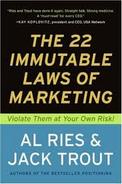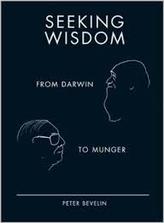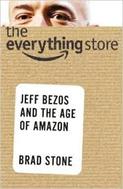 I just finished reading this marketing classic: The 22 Immutable Laws of Marketing by Al Ries and Jack Trout. It was short and sweet and portrayed quite a different perspective on branding than what I had thought about before. The authors are pretty against line extension in the simple sense of slapping a big brand name with "equity" on other products just to make them look good in the light of the big brand. They argue that a company stands for a word in the mind of the consumer, and the first one to grab a word will own it forever as long as they maintain their focus. So the right way to expand is through dedicated brand names per product. This was a nice wake-up call and harkened to a lot of similar ideas about leadership and winning a whole market segment from Zero to One. The book's examples are somewhat dated (referring to computer technology as very nascent and speaking about Lotus as the leader of a category), but that didn't detract at all from the main points (in fact, it was eery evidence of how our predictions can be wrong in either direction, where some things change a lot while most things stay the same). Overall, I really enjoyed the book for its new perspective. It's interesting how so many of its laws are violated all the time, and I wonder if the authors are right about the long-term consequences for those who do violate them.
0 Comments
 I just finished reading the second book I acquired by Peter Bevelin about Munger and Buffett: Seeking Wisdom: From Darwin to Munger. I really, really liked this one! It was like a compendium of all the major lessons from biology, psychology, math, and business along with applications to everyday life and investing. I can tell that Peter is an avid reader, and I was impressed by the enormous number of references to both classical and modern texts of "wisdom." He's clearly also someone who likes to take notes on the biggest lessons he learns from his reading! It'd be awesome to meet him one day. It was also fascinating to read what he learned firsthand from Munger and Buffett and through their prolific writing. After reading this book, I am now even more impressed by the simplicity and wisdom of Munger and Buffett, and I took a lot away from this book about how they view life and approach business. A recurring theme in this book and others I've read this year (like What I Learned Losing A Million Dollars) is that studying and avoiding mistakes and acting rationally will get you pretty far in life; it's not about hitting it out of the park through unlikely genius or strokes of luck.  My friend Tracy (interviewed on Tim Ferriss's podcast) recommended The Everything Store: Jeff Bezos and the Age of Amazon by Brad Stone, so I wanted to check it out. I've enjoyed learning the stories behind the founding and ups and downs of different big companies, and as a long-time fan of Amazon, it was very interesting to get a sneak peek into how the company started and what myths about it are true and false. I was shocked to learn that Jeff came from a quantitative finance background and how far he bootstrapped the company on his own. That was really impressive. I also found it interesting how ruthless and dedicated to low pricing the company has been and how it did not shy away from any mercenary tactics to get the terms it wanted. For example, it heavily squeezed vendors and frequently pulled their products from the store until they came back begging to negotiate. This can be seen as manipulative, but it can also be seen as dedicated to providing the lowest possible price to customers. My biggest question is why treatment of employees doesn't get bigger focus there. I understand the core value of frugality of appreciating and being able to survive in harsh conditions, but I think retaining the best talent will be important for the company's success, and I wonder how they will keep managing to do that. |
Archives
June 2024
Categories
All
Subscribe |
 RSS Feed
RSS Feed
